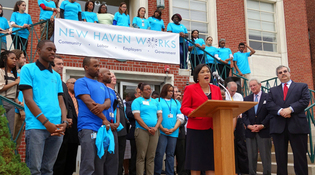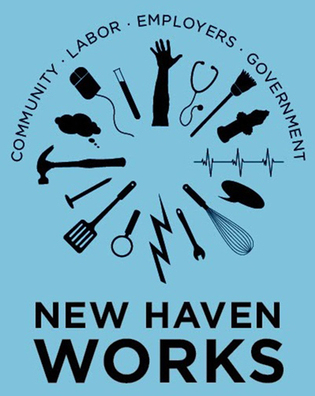 loading
loading
New HavenHelping New Haven workA nonprofit jobs pipeline is showing results.  Courtesy New Haven WorksNew Haven mayor Toni Harp ’78MEnvD, backed by a troop of New Haven Works interns, spoke at a celebration of the organization's first anniversary in 2014. View full image View full imageIn 2011, Kelly Moore became a casualty of the Great Recession: she lost her job with Citizens Financial and, although she applied for a series of positions in finance, the working world seemed closed to her. Then she set her sights on a job at Yale. Moore, who is now 31, grew up in New Haven, attended local schools, and played basketball at Payne Whitney. “I either wanted to work at Yale or go to school there,” she says. “It was almost like a dream.” So she applied for every reasonable position she could find, including some she “was probably overqualified for—custodial work, sanitation work—anything to work for Yale.” She didn’t get anywhere. At that point, Moore turned to New Haven Works. New Haven Works is a nonprofit jobs pipeline designed to help New Haven residents find employment in the New Haven community. A joint project of the Board of Alders, local employers (including Yale), labor unions, and residents, it was launched in June 2013. The first-year goal was to place 250 people in jobs. By June 2014, the group had helped 323 New Haven residents find full- or part-time work. New Haven Works asks the employers it partners with—which include, for instance, Yale–New Haven Hospital, United Illuminating, and the City of New Haven—to list their hiring needs, available positions, and the credentials and skills required for each. In return, it guarantees that the job applicants it recommends have been screened and deemed qualified. Employers are asked to give concrete feedback to all job seekers—so that, says executive director Mary Reynolds, “if the applicant isn’t the best candidate, at least they’ll know why.” New Haven Works also gives advice on résumés and interviews. “There are a lot of talented New Haven residents who just need a foot in the door,” says Reynolds. It worked for Moore. She was invited to a meet-and-greet with representatives of Yale’s human resources department. They made suggestions for improving her résumé, and soon afterward, when a temporary position opened up in Yale’s business services center, Moore applied and got the post. A couple of months later, a permanent position became available. Again Moore applied and got the job. “It worked extremely well for me. I couldn’t see myself coming into the university any other way,” Moore says. By now, New Haven Works has helped more than 500 city residents find full-time jobs, temporary assignments, or paid internships. (It has also enrolled 67 young people, ages 18 to 24, in internships.) Reynolds says those who seek help from New Haven Works run the gamut: 25 percent have college degrees, and 17 percent are former offenders. The group accepts all who are eligible—New Haven residents 18 or older—and currently has a thousand “members” looking for work. “We like to help candidates with a strong work history who lost a position or are starting a career,” Reynolds notes. As Moore sees it, “You feel like they’re invested in you, not because they have to but because they care.” Meanwhile, she’s investing in herself: she’s working on a master’s degree in business and finance at Albertus Magnus, and she recently finished reading Lean In.
The comment period has expired.
|
|